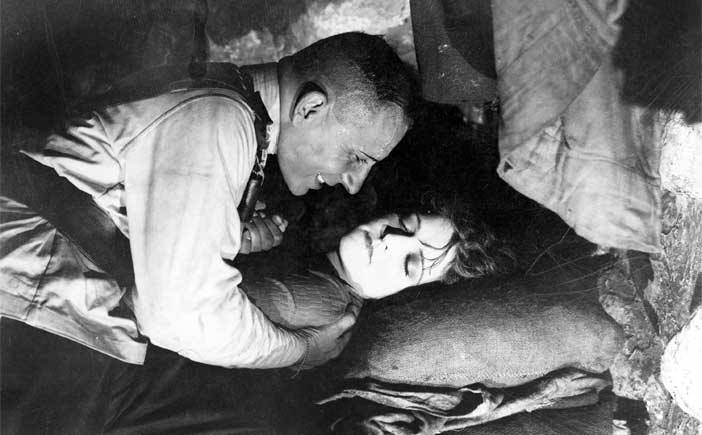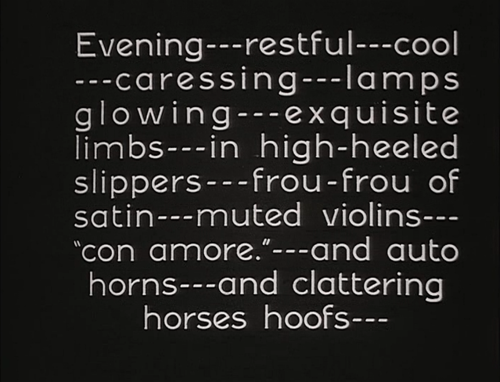Erich Von Stroheim’s Monte Carlo Masterwork
DIRECTOR: ERICH VON STROHEIM/1922
 “Since that first showing of FOOLISH WIVES, I have seemed to walk through vast crowds of people, their white American faces turned towards me in stern reproof.”
“Since that first showing of FOOLISH WIVES, I have seemed to walk through vast crowds of people, their white American faces turned towards me in stern reproof.”
– Erich von Stroheim.
Far-off locations…young wives…neglectful husbands…and von Stroheim, ready to seduce the wife. It’s a recipe which served von Stroheim well in his previous endeavor, titled Blind Husbands (1919), but is set in a much more exotic location: Monte Carlo. Suicides, love, money, waves, and maimed veterans of war are everywhere. Von Stroheim’s project shows a great deal of the decadence and excess of the rich and playful of his (or any) generation.
Von Stroheim’s work is often marked by an attention to detail. In Foolish Wives, as in all of his productions, the sets are lavishly decorated. The caviar is real. All of the grandeur of the casino is on display, from the lighting fixtures to the carpet the actors tread. One is transported from the hum-drum of daily life to a place where money means nearly nothing and where pleasure means everything. Almost.

Monte Carlo @ Universal Studios. Built to scale.
The landscape is dotted with the suffering of war. Numerous injured and maimed World War I veterans stroll, wheel, and hobble past the camera in various scenes, showing the harshness of life, even amongst the beautiful casinos. In later films such as The Merry Widow and Queen Kelly, von Stroheim would continue to develop such picture-themes by contrasting the woman’s love interest with her main competitor. But before one perceives a black-and-white presentation of good vs. bad, von Stroheim is adept at showing Andrew Hughes’ shortfalls as the bumbling, sometimes thoughtless and often inattentive husband while still showing the alternative (himself) as being heartless and unafraid to walk all over anyone who stands between him and his ambition. As an audience member, I know I’m supposed to be put off by the Count’s antics, if not outright repulsed by his predatory ruse—yet I am not. I wait for the redemption that so many films provide in the end, even after having seen the film previously. It’s something for which I wait in vain: the Count never repents of his debauched subterfuge.
Erich von Stroheim’s creation is interpreted by many to be an affront to Americans in general. I’m not fully persuaded that this was his point, though it seems that this was the point which many extracted from the film at its premier in 1922 (as seen in the quote with which this review began).
To be sure, von Stroheim pokes fun at the informality of the Americans in the story. But based on the behavior of the Europeans, I’m not sure he’s exactly commending them to his audiences, either.
They may know how to better remove their gloves in the presence of royalty and be ‘at home’ in matters requiring delicate social convention. However, the social convention doesn’t ultimately make the Europeans better people. One scene in which the anti-hero and demoiselle en détresse are trapped in a burning building is especially illustrative: the Count leaves Mrs. Hughes in the building, opting to escape the flames first.

Even in the 1920s, Hollywood understood that sex and depravity sell tickets—but this is not why the film is compelling. The film, while not a commercial success, is compelling because it shows the baser side of humankind. One doesn’t find it fantastical that a man would swoop in to take advantage of him through his wife and to take advantage of her in the process as well. One also doesn’t find it fantastical that a woman would want to be wooed by someone who seems to find her attractive and wants to spend time with her. But these things by themselves are not sufficient to make a good film. The secret lies in the way in which von Stroheim, now subtly, now explicitly, demonstrates these desires on film—showing us feet and other common sexual images—and makes the audience voyeurs of these debased looks and acts. We are the complicit bystanders in von Stroheim’s profligacy.

The movie does have a moral in the end: the Count pays for his sin and the wife realizes what she wanted was her husband the whole time. It’s a fairly conventional ending, but seems a bit out of place given the seriousness of the rest of the film. It is quite possible that the ending suffered from a movie that had been cut down from six hours to a more manageable length which needed an ending. A much more compelling ending would have excised the final scene, but perhaps a “happy ending” was felt to be necessary. Despite this unnecessary coda, the film still stands as a cinematic storytelling triumph.

